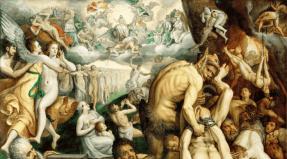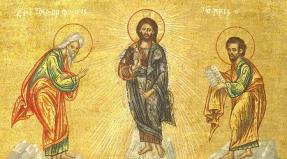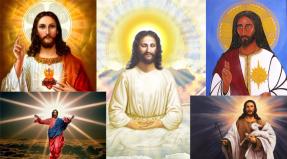Blessed beggars in spirit for. What does the blessed poor in spirit mean in Orthodoxy
“Blessed are the poor in spirit, for theirs is the kingdom of heaven” (Matthew 5: 3)
Of course, a truly proud person rarely sees himself as he really is, because in this case he will need to admit that his lifestyle is contrary to Jesus' Sermon on the Mount. Christ offered a bliss based on a new way of life, on the ideals of righteousness, and on concepts of self-denial. This greatest sermon ever spoken on earth speaks of the kind of bliss that comes from self-denial.
I believe that the Sermon on the Mount applies to all of humanity. Some evangelical believers consider the Sermon on the Mount to be too sublime and impracticable. For example, the words spoken by Jesus Christ in Matthew 5:48: "Therefore be perfect as your Heavenly Father is perfect", they consider it too difficult to fulfill and attribute them to the Millennium. They say that the Sermon on the Mount gives the principles of the kingdom of God. However, this point of view creates many problems.
First, the text itself says nothing about the Millennium. Second, Jesus was speaking to people who did not live in the Millennium (this is perhaps the strongest argument). Thirdly, it becomes completely incomprehensible how the events described in the Sermon on the Mount can take place in the Millennial Kingdom, namely: the persecution of true believers, their expulsion and all kinds of unjust slander. Where can such wicked people come from in the Kingdom of God?
Words from Matthew 5:44: "Love your enemies and pray for those who offend you and persecute you" would not make any sense if the Sermon on the Mount were about the Millennial Kingdom. In addition, all the principles discussed in the Sermon on the Mount can be found elsewhere in the New Testament. We cannot attribute all this sermon to especially holy people who will live in the Millennial Kingdom.
This sermon was spoken for us. It sets out the distinctive features of a true Christian living in any historical period. She encourages us to come to a new way of life. Jesus says, "Your way of life must be like this if you want to know bliss." Isn't it wonderful to know that our God does not at all want to deprive man of joy, as some unbelievers claim? Or that He is not going to "command your parade" at all? God wants us to be happy. God wants us to be blessed. And He will give us those principles that are quite accessible to us.
This is a special life. If you live such a life, I assure you that you will be different from other people. However, few people live by these principles. Many Christians today have lost the distinctive qualities of the Sermon on the Mount. The world has shaped us in its own way, and made us embrace worldly concepts of music, morality, marriage, divorce, liberation movement, materialism, diet, alcohol, dance, sports, commercial ethics, clothing, entertainment, etc. However, God wants us to be different from the world. And He says that if we live according to His patterns, we will be blessed. But, however, everything starts with the consciousness of spiritual poverty.
When I buy a new car, I first of all read the instructions for it in order to know how to drive it. Of course, I already know the basic things about driving a car, but the instructions for this car say something that I can only read in this manual, since no one knows this car better than those who built it. Everything in our world was created by God, but few people turn to Him for advice on how to organize their lives. But they should have asked God how they could fulfill their destiny. "You created me, you and tell me." And Jesus says everything you need to live on earth!
He is interested in the inner state of a person. But this does not mean that his actions do not matter. However, if everything is right inside, then the outside will be right. Faith without works is dead. You are created in Christ Jesus to do good works. However, a person's actions can be true only if the inner state of a person is filled with truth. If this sounds paradoxical, then notice that everything said in the Commandments of Beatitude is a sacred paradox and is in stark contrast to worldly ideas.
The concepts of blessing and bliss, the Greek word "makarios" is translated, in the Holy Scriptures the word misfortune, grief is opposed. And Jesus does not say: "I want you to be blessed." He says categorically: "Blessed are you ..." And when He says the opposite: "Woe to you ..." Is not just a wish. In both cases, it is a judicial verdict.
Note the sequence of the Beatitudes. First we see the bliss of the poor in spirit, which is the right attitude towards sin and which then, in verse 4, leads to sorrow, tears. Realizing your sinfulness and mourning for it, you will experience a sense of meekness. Then you will begin to hunger and thirst for the truth. Do you see this progress? Then you will become merciful (v. 7), a pure heart (v. 8), and finally, a peacemaker (v. 9). The result of your becoming a pure heart, merciful and peacemaker will be persecution and unrighteous backbiting. Why? Because the consciousness of all your spiritual poverty, your sorrow and tears of sinfulness, meekness, mercy, greed and thirst for truth, your peacemaking - all this will irritate the world.
However, when all this happens, according to verse 12, you will have joy and a sense of bliss from knowing that you will receive a reward in heaven. And if you live by these promises of Bliss, you will receive the assurance that you are the salt of the earth. This is exactly the case. And you will also be the light to the world. However, you cannot be the salt or light that is spoken of from verse 13 unless you start from verse 3.
So let's look at verse 3.
Why did Jesus Christ start out in spiritual poverty? He wanted to talk about a new life, new concepts and a new way of life. Why did He start with this? Why is spiritual poverty made a source of bliss? Because it is the main characteristic of the Christian. Awareness of one's spiritual poverty is the very first thing that a person needs to enter the Kingdom of God. No one can enter it on the basis of their pride. The door to the kingdom of God is very low and only one who bows deeply can enter it.
Paradoxically, knowing that a Christian needs to rise to the top and achieve the highest ideals in life, we sooner or later come to the conclusion that this is impossible. And the sooner we come to such a conclusion, the sooner we will resort to the One who alone can help us achieve all this. In other words, Jesus tells us: “You cannot be filled until you become empty. You cannot become valuable until you realize that you are worthless. "
It amazes me that Christians today speak so little about their emptiness. I know many books on how to be filled with joy, how to be filled with the Holy Spirit, how to be filled with this and that, but I don’t know books that tell you how to empty yourself. Can you imagine a book titled How Can You Become Nothing? or: "How can you be nobody?" Do you think such books will become popular?
Spiritual poverty is the foundation of grace, yet modern Christianity strives for pride. You can expect fruits to grow on their own without a proper fruit tree, just as successfully as your Christian life to grow in grace without humility. Unless we are poor in spirit, we cannot receive grace. You cannot become a Christian if you are not poor in spirit. If you are not a poor in spirit in the Christian life, you can never know what grace is.
Jesus says, “Start with this. Bliss belongs to the poor in spirit. " Until a person shows humility, Christ will not be dear to him. We cannot see Him as He is until we look not at Him, but at ourselves. As long as a person sees only his desires, needs and demands, he will not be able to understand the ineffable riches of Christ. Until a person sees how defiled he is, he will not see how glorious Christ is. Until we see our poverty, we will not see His riches. In death we will come to life. No one can come to Jesus Christ and cannot enter into His Kingdom without the horror of shuddering, without the consciousness of his sinfulness and without repentance. Proverbs 16: 5 tells us that pride is an abomination to God.
God gives grace to the humble. That is why it is about humility from the beginning. The only way you can come to God is by confessing your unrighteousness, admitting your inability to live up to God's standards, admitting that you are unable to fulfill God's requirements. A person must come to God with a sense of helplessness and hopelessness in order to receive God's grace from Him, and feelings must be sustained in order to maintain grace in the Christian life. Although it may seem paradoxical, this principle works, and we will see this later.
There are many madmen in this world who have never known the truth. Even Christians who have come to God on the right basis later set off in pursuit of the raptures of modern Christianity. However, we have nothing good in our flesh. That is why Christ began His sermon with the question of spiritual poverty.
What does it mean to be “poor in spirit”? What kind of poverty are we talking about here?
Some believe that it is about material poverty. But if Jesus Christ had in mind only people without money, then the worst thing we could do as Christians is to give money to those who do not have it! Helping those in need would be highly undesirable. Feeding the hungry would be unacceptable. We should have stopped all charity. We would need to take money away from all people and make everyone beggars so that they become blessed and ready to enter the Kingdom of God. And then we'd be good missionaries, wouldn't we? It would be horrible to have money, and of course we would die.
However, God says nothing about material poverty. Moreover, David says that he never saw a righteous man in need, or his children asking for bread (Ps. 37:25). Although the apostle Paul experienced hunger and poverty, he was never a beggar. Jesus Christ never asked for food. Christ and His disciples were accused of being “out of their minds” when they wanted to “turn the world upside down,” but they were never accused of being poor. (If they were beggars, the scribes and Pharisees would not fail to point this out.)
So what kind of poverty does Christ mean? He says: "Poor in spirit", i.e. about spiritual poverty. Greek word "Ptokas", translated by the word beggars, means material poverty, i.e. a completely hopeless state, when a person is even ashamed, no matter how someone recognizes him. This is not about simple poverty, but about absolute poverty. There is another word in the Bible - Penase, which means that the person is so poor that he has to earn his living. "Ptokas" means - a beggar who should beg. "Penase"- this is a poor man forced to earn his living. "Ptokas" means that you cannot live without help. In this case, you are completely dependent on others.
"It is just like that," says Jesus, "blessed."
How can it be? Again, this seems absurd, doesn't it? “But we have just established that we are not talking about material poverty. Jesus Christ speaks of spiritual poverty, and the word used by Him is just right in this case. This is the best analogy you can find. A spiritually poor person is truly spiritually empty, poor and helpless. Can he earn his salvation? Is he spiritually penase, i.e. one who can only earn eternal life for himself? No. He is not penase - poor. He is truly a ptokas - a beggar.
A person is absolutely helpless and depends only on God's mercy, and Christ says: "Blessed are the have-nots, absolutely everything, the poor." What a strange statement! However, let's go further.
Said "Poor in spirit", therefore, we are talking about the soul of a person, and not about his body. That is, the essence of a person lies in his soul, and not in his body. God says this about it: "But to whom I will look: the humble and contrite in spirit, and the one who trembles at My word"(Is. 66: 2). In Psalm 33 verse 19 says: "The Lord is close to the brokenhearted and will save the humble in spirit"... And in Psalm 50:19: “A sacrifice to God is a broken spirit; you will not despise a broken and humble heart, O God ".
God is close to those who are poor in spirit, not self-righteous, who believe that he himself can earn his own salvation. Being poor in spirit does not mean that such a person has a dull spirit and that he is devoid of all enthusiasm. This does not mean that such a person is lazy or quiet, indifferent and passive. A poor in spirit is one who has no sense of self-righteousness.
Look at the best example of self-humiliation and self-exaltation given in the Gospel of Luke in chapter 18. This is the story of a Pharisee who was proud of his righteousness and a publican who, like a beggar, asks God for mercy. The Evangelist Luke tells about something very important: "He also said the following parable to some who were sure of themselves that they were righteous and humiliated others." How did Jesus end this well-known parable? This is what He said about the publican: “I tell you that this one went to his house justified more than that one: for everyone who exalts himself will be humiliated, but he who humbles himself will be exalted” (v. 14).
It is said very clearly. Blessed are those who are poor in spirit. Blessed are the spiritual poor, blessed are the spiritually empty, spiritual bankrupts, “cornered” and pleading for God's mercy. They are the ones who are happy. But why? Because only they know about the true source of bliss. Only they can know God. They will inherit the Kingdom of Heaven not only later, but also here and now.
This truth is expressed not only in the Sermon on the Mount. James 4:10 says: “Humble yourselves before the Lord; and will lift you up ”... It is not the poverty against which the human will rebel, but the poverty in which one is humbled. In modern sacrifice, this doctrine is highly unpopular, especially among Christians who have achieved success and recognition, as well as wealth and influence. However, bliss belongs to the humble.
The Old Testament Jacob had to realize his spiritual poverty before God could use him. He wrestled with God all night, according to chapter 32 of Genesis, and God wounded him in the thigh. He put it, so to speak, “on the shoulder blades,” and then it is said: “And (God) blessed him there”(Gen. 32:29). God blessed Jacob when he humbled himself.
God could not use the prophet Isaiah until he became a poor in spirit. In the year of the death of King Uzziah, he wept over his loss. and then God, by His grace, showed the prophet what his own life is and who he really is. God also showed Himself in a vision to the Great and Exalted One, and then Isaiah exclaimed: "Woe is me! I am lost! for I am a man with unclean lips ... and my eyes have seen the King, the Lord of hosts ”(Isa. 6: 5). And only after that God blessed him.
Gideon was conscious of his impotence. He said, “Lord! How will I save Israel? Behold, my tribe is also the poorest in the tribe of Manasseh, and I am the youngest in my father's house ”(Judges 6:15). To this God answered him: "The Lord is with you, a strong husband!"(v. 12). From here you can find out which of the people is the strongest. This is the one who is aware of his human impotence.
This was the spirit of Moses. He was so clearly aware of his powerlessness, his inability, and so understood his inadequacy and unsuitability that God used Moses, placing him at the head of the chosen people of God. The same was the heart of David, who said to God: "... Who am I, Lord, Lord, and what is my house, that You have magnified me so much"(2 Kings 7:18).
You see the same thing in Peter, who was by nature a persistent and self-confident man. However, he told Jesus: “Get out of me, Lord! because I am a sinful man "(Luke 5: 8). The apostle Paul recognized that there was nothing good in his flesh. He was the greatest of sinners, persecuting and persecuting the church of God. Anything he thought was an advantage was actually a disadvantage. He refused all this. He personally was not capable of anything good. And he became strong in his weakness.
The world says to man: "Defend your rights, be proud of yourself, win your place under the sun." But God says that when a person realizes his weakness, when he recognizes that he is nothing, then this is not the end, but on the contrary - the beginning! However, the hardest thing to do is, Jesus says that the first thing a person needs to do is realize his powerlessness. This is spiritual poverty. Consider the parable of the debtor slave found in Matthew chapter 18. He owed his master such a huge amount that he could never pay. Further it says: “Then that servant fell and, bowing to him, said:“ sir! bear with me, and I will pay you everything "(Matt. 18:26). In other words: this slave hoped that he could pay his debt himself.
Jesus Christ wants to show with this parable how unwise it is to say to God: "Be patient and I can do everything." Being poor in spirit means realizing that we have no opportunity to please God, and therefore we have nothing to be proud of, nothing to rely on, and nothing to hope for. You need to be empty in order to be filled later. And this is the path that we must walk all our lives, and not just the path to receiving salvation; this is how our whole life should be.
Before his conversion, Saint Augustine was so proud of his wisdom that this prevented him from becoming a believer. And only after he gave up his pride, he was able to know God. Martin Luther went to a monastery in his youth to earn his salvation by his piety. When, after many years of efforts, he became convinced of his inability to achieve this, he was forced to openly admit that he could not please God. He emptied himself and acknowledged that God gives the hope of salvation by faith. This is how the Reformation was born.
Hope for life exists only for those who know they cannot please God. This is such a high standard that those who were first given the Law on Mount Sinai could not reach it even for a short moment. God in His Law forbade idolatry, fornication, theft, murder, and so on. But even at the moment when God gave this law, people immediately violated it. While God spoke to Moses, Aaron allowed the people to fall into an orgy. God's standard is far beyond human ability.
Some of the ancient Israelites were aware of this, and according to God's direction they made the appropriate sacrifices, and in humility confessed their sins, and God, with great mercy, forgave them. But there were also those who thought that they could do everything. They made sacrifices and prided themselves on self-righteousness and tried to fulfill the law by their own efforts. However, they could not fulfill the law, and then instead of humbly seeking the mercy of God, they began to gradually replace the requirements of the law with human traditions. And human traditions are much easier to follow than God's laws.
The laws of the Talmud are Jewish laws based on the Torah (the true Law of God), which are nothing more than clearly understated norms of the Torah. Taking comfort in their fulfillment, a person thinks that he is fulfilling God's laws. The rabbis said that they were trying to uphold the laws of God, but in reality they were talking about much lower requirements, corresponding to their level of self-righteousness. At the time Jesus Christ came to earth, they were very successful in fulfilling the minor requirements of the law, while on a daily basis they violated the basic requirements of the true laws of God (see Isa. 29:13 and Matt. 15: 9).
The Sermon on the Mount is the law of God. He prescribes what kind of life to lead. However, we are unable to obey the law! But with the assistance of the Holy Spirit and the consciousness of our dependence on Jesus Christ, we have a desire to live exactly according to the prescription of the law. Convinced of our inability to live such a life, we regret it in contrition. Jesus gave us His examples when He said: “… Be perfect as your Father in Heaven is perfect” (Matt. 5:48).
He also says that if the righteousness of a person does not exceed the righteousness of the Pharisees and scribes who lived by the fulfillment of the secondary requirements of the law and human rites, then he will not enter the Kingdom of Heaven. The true purpose of the law given in Zion is the same as that of the Sermon on the Mount, namely, to show people that they are unable to fulfill God's commands themselves. The lower standard, invented by people, is only the purpose for which the Sermon on the Mount was given.
We must realize the greatness of God's law and confess our spiritual poverty and our complete dependence on God, and then we can fulfill His law. You cannot give this law to an unregenerate person and wait for him to live according to it. The Apostle Paul directly says that the purpose of the law was so that every person could realize his guilt before God and come to Jesus Christ, who alone can remove our guilt. This is the kind of spiritual poverty that Jesus Christ speaks of.
What is the result? "... For theirs is the kingdom of heaven"... What a wonderful promise! This is not just a wish. This is a real fact! The Kingdom of Heaven already belongs to the poor in spirit. And this statement can be trusted. So, to whom does the Kingdom of Heaven belong? - Who is the beggar in spirit. The verb is in the present tense. This means that the Kingdom of Heaven belongs to me and to you, if we correspond to the standard of God.
We're not just talking about the Millennium. This is our Kingdom and it belongs to us now. Of course, someday there will be a Millennial Kingdom, in which the promise will be fulfilled in reality and will blossom completely, but the Kingdom, which is discussed in the Sermon on the Mount, already exists now. Bliss reigns in him now. Bliss reigns in him now. The Kingdom of Heaven is the accession and reign of Jesus Christ in the heart of everyone who believes in Him and has accepted as Savior and Lord. And this is not only a picture of the Messianic future, it is an expression of the present. We are already a royal priesthood. We already belong to Christ. We are already the winners. We have already, as it is said in chapter 2 of the Epistle to the Ephesians, are planted in heaven, and His mercy and grace have been extended to us from now on and forever.
The kingdom is, as I understand it, grace and glory. Grace now, and glory later. We have a kingdom. It is ours, Christ rules in it, and He rules our life. Do you know what this means? We belong to Christ and He cares for us. He meets all the needs of our hearts. And this is the result of spiritual poverty.
How can you become a poor in spirit? You say, “I agree that the most important thing is to be poor in spirit. But how can I become like this? " Let me outline three principles. First, don't try to achieve this on your own. This is where people are mistaken, preferring monasticism. Some think that they will be poor in spirit if they become hermits, sell all their property, put on rags and go to a monastery. All this will not help in the least. It doesn't matter how you look in your own eyes or in the eyes of other people. What matters is how you look in the eyes of God.
Read the Bible. The image of God is painted on the pages of Holy Scripture. Look at Christ, think about Him and His Word, and then you will forget about yourself. And this is not mysticism at all. This should become a daily practice. We must look to God every day. This is the first principle.
Second, tame your flesh. I’m not talking about the food that our body eats, I’m talking about fasting for our flesh. Today, even some Christian ministers constantly feed their carnal nature with pride. We must try to expose our carnal nature. It is a constant struggle to find such a spirit.
The third principle is very simple - it is asking. Do you want to be poor in spirit? - Ask God about it. "God," said the tax collector, "be merciful to me." Jesus said that the tax collector went to his house justified. Blessed is the poor in spirit. He is one of those to whom the Kingdom of Heaven belongs.
So why did Jesus begin by saying that you have to be "poor in spirit." Because it is the basis of everything else to be spiritually bankrupt and be aware of it. As a result, the Kingdom of Heaven will belong to us here, now on earth and forever. How can you become a poor in spirit? - I repeat, look at God, mortify your flesh, ask like a beggar. God is not against it at all.
How can I know if I am a beggar in spirit? You need to make a self-assessment. The following are seven principles for this:
You will be cut off from yourself (Ps. 130: 2). The poor in spirit loses the sense of his own self. It goes away! You will only think about God, about His glory and about other people and their needs.
You will constantly be amazed at Jesus Christ, “Beholding the glory of the Lord”(See 2 Cor. 3:18). You will speak like Philip: "God! show us the Father, and that's enough for us ”(John 14: 8). You will speak like David: "When I Awake, I Will Be Satisfied With Thy Image"(Psalm 16:15).
You will never grumble about the circumstances of your life. Why? You don't deserve anything else, do you? What can you offer? The lower you go, the sweeter the grace of God is for you. The greater your need, the more He cares for you. When you give up everything, you will be ready to receive an abundance of God's grace. There is no contradiction in this. You will suffer uncomplainingly because you deserve nothing else, but even then you will seek His grace.
You will see in others only their positive qualities, and in yourself only your weaknesses. A truly humble person never exalts himself, but others.
You will spend a lot of time in prayer. Why? Because the beggar always asks. He often knocks on heavenly doors and does not leave them until he receives a blessing.
You will come to Jesus on His terms, not yours. Proud sinners would also like to have Christ, but their own pleasures, Christ and their own greed, Christ and their own immorality. The poor in spirit is in such a hopeless position that he is ready to give up everything, just to have Christ. “The besieged fortress, close to fall, is ready to surrender at the mercy of the victor and thus be saved. The one whose heart for a long time was a strength for the devil, and who resisted Christ, having learned about his spiritual poverty, feeling it, seeing that without Christ he is worthy of eternal damnation, will humble himself before God and turn to Him with a simple prayer: “Lord, what will you command should I do? "
Finally, you will praise and thank God for His mercy. If a person is truly poor in spirit, he will be filled with gratitude to God. All you have is a gift from God. The apostle Paul says: “The grace of our Lord (Jesus Christ) has been abundantly revealed in me”(1 Tim. 1:14).
How do we evaluate ourselves? If we believe that we are not worth anything at all, then we are on the path to bliss. "Blessed are the poor in spirit."
Studying the Orthodox commandments, people come across not entirely clear thoughts. What does “blessed are the poor in spirit” mean? These words can cause dissonance today. After all, they prove to us from all sources of information that development is necessary to achieve success. People are encouraged not only to acquire professional skills, but also to grow spiritually. And this means the cultivation of willpower, aspiration, perseverance, and so on. And here "blessed are the poor in spirit." How to understand this expression, what does it mean? Let's figure it out.
Let's look at the beggars
Maybe this is not the most pleasant experience, but you will have to delve into the psychology of a poor person. The first commandment reads: "Blessed are the poor in spirit, for theirs is the kingdom of heaven." How so? According to Jesus, for people who have nothing in this life, do not create, do not produce, the heavenly gates are open. It seems that there is some kind of contradiction in this, but only for a modern person, subject to the influence of society. Jesus looked at the beggar differently. The one who is, so to speak, at the bottom has no ambitions. He is ready to accept any help, as long as it is offered. This person does not have the pride of an ordinary person. He is not afraid of loss. He only has life. This person considers himself so insignificant that he does not judge others. He lives by simple interests. Today there is bread and water - good. For this he thanks the Lord. And if there is nothing, then he will wait for help from kind people. The beggar does not exalt himself, does not try to rise above society. This person is not aware of the usual worries about property damage or problems at work. His soul is free from burdensome property troubles and worries.

About spirituality
Have you thought about the direction in which our society is developing? If in the past centuries people considered material goods to be of value, now talents have become more expensive. Anyone who knows how to generate knowledge, transfer it to others, thrives. To them, too, Jesus said: "Blessed are the poor in spirit ..." This phrase is intended so that a genius does not value his abilities above communication with the Lord. Our skills and abilities are capital, we are taught this from childhood. There is nothing wrong with that if you do not use them to the detriment of others. After all, the Lord grants the ability so that his children improve the earth, develop this space. It is important not to feel proud that you are able and have more than others. Sin lies in contempt for those who are not talented. This applies to any ability, including spiritual. There are people with incredible wisdom who know how to lead others. They have to constantly struggle with the temptation of pride. To be able to maintain faith in the Lord - that is what it means "blessed are the poor in spirit." One must constantly remember: there is nothing more valuable than unity with the Almighty. Feeling it in yourself is the fulfillment of the covenants. And the one who is with the Lord is protected from temptations, including pride.

"Blessed are the poor in spirit": interpretation
Christianity considers humility to be the main virtue. It consists in the fact that a person trusts only in the Lord. He does not try to give, do or offer him something. There is no place for bargaining in this relationship. The Christian trusts in the kindness of God, completely and unconditionally trusts him. His soul is pure and sincere. There is not a shadow of a doubt in it. Humility is the ability to accept everything from the world. Since these gifts come from the hands of the Lord. If something bad happens, you should thank the Almighty and not grumble. It means that today you do not deserve more. And of course, you need to say "thank you" for every little thing you get in life. After all, any person has more good than bad. We got so used to these gifts that we stopped noticing them. And this is pride, sin. When asking yourself how to understand “blessed are the poor in spirit,” try to focus on the joy you receive on earth. Like this? Let's give an example.

What good is there in our life?
Take the average person living in the Russian-speaking world. What does he get almost every day? Say, some problems and troubles, multiplied by the negativity spread by the media? And we will try to find what you probably stopped appreciating:
- air that will allow you to live;
- supportive and helpful parents;
- food and shelter;
- work if there is a desire to work;
- if necessary;
- health;
- support from friends;
- smiles of loved ones;
- the opportunity to have children.
Believe me, you can list it endlessly. But do people really appreciate these gifts? They consider them natural. And what does this lead to?

The consequences of ingratitude
Also, we will not argue for a long time. Here are a few chains that will demonstrate the logic, think about the rest yourself:
- Those who have shelter and income are afraid of losing it. He is afraid of robbers, wars, economic crises and more.
- A healthy person thinks with hostility about possible ailments.
- He who has parents, family, friends is afraid of betrayal and death.
- Those who work and realize their talents are afraid of losing their place or chance.
This list can also be continued indefinitely. We took only the most common things as an example. Just the next time you think about what “blessed are the poor in spirit” means, remember the gifts of the Lord. There are people who are unlucky. They have no health, or talent, or a peaceful sky over their heads. Do they all murmur?
What is the most valuable thing in life?
Probably, the question in the subheading is naive. Everyone has their own values. This is true and false at the same time. There are They are quite difficult to refute completely. Believers believe that being close to the Lord is the most important thing. Believe me, many have tried to prove the opposite. It worked until the trouble happened. And only after experiencing grief, a person realized that the support of the Almighty is the most important thing that he has. After all, no one will tear this force out of the soul. It does not depend on the rulers or the media, the opinions of friends and enemies. This is a given that can be rejected or accepted, but not disputed its existence. So, “blessed poor in spirit” is a commandment to love God? The priests consider, rather, a reminder. This is a short parable about the integrity of the world and its frailty at the same time.

Does this truth need a modern person?
It is suggested that humility be remembered again. This is real wisdom that allows you to look at yourself from the outside, to really appreciate the shortcomings and advantages. And since you understand what your value is, you know how to choose the right field for applying your strength. In addition, a person who evaluates himself adequately does not experience problems with communication, loves and receives reciprocity. He is happy! And you say that you need to strive for success at any cost. Always remember that blessed are the poor in spirit, that is, people who love their Creator above all else. They have much less fears and conflicts in their souls. There is someone you can lean on. And he will never betray, change, manipulate or deceive. He is the essence
Conclusion
If you understand the frailty of the material goods and intellectual values given to you, then you live easier and more natural. Try for one day to forget about the fears generated by pride. This little experiment will take you back to childhood. Believe it or not, babies are practically the only category of people who truly understand the phrase under study. They have no worries, they completely trust their parents, seeing the Lord in them. Do you remember?
"Blessed are the poor in spirit, for theirs is the kingdom of heaven."
I heard this phrase more than once, but did not perceive it in any way. I am by itself, the phrase is by itself. We coexisted in parallel.
Why is it suddenly hooked? Do not know. Somehow I missed this moment, but suddenly I realized that I wanted to figure out what was the matter. Why are these poor in spirit so happy (and bliss, as you know, is the highest form of happiness)? And who are they? Moreover, the questioning of acquaintances (believers and doubters) did not bring much clarity.
I had to turn to dictionaries and articles by religious authors.
It turns out that the "POOR IN SPIRIT" is not at all a person who lives with base interests, as many people think.
“Poor in spirit” the church calls people humble: devoid of pride and arrogance, submissive, meek, modest, harmless, patient and even impersonal, that is, devoid of their individuality, not distinguished from others.
(The church also called the madmen "blessed", treating them with special attention and reverence.)
At first glance, this seems strange.
How are we used to it? Appreciate people who are bright, not similar to others, leaders who lead them, who know how to think outside the box, who have said a new word in science, literature, art, technology ... And the slogan "Sit and do not stick your head out" is perceived sharply negatively.
On the other hand, pride and arrogance are condemned by unbelievers as well. These are far from the best human qualities. And we are ready to grumble for any reason and for any. Which does not make our life and relationships with people better.
And from this position, the statement “Man - it sounds proudly” has long seemed dubious to me. Take a look around. We stubbornly disfigure our planet and turn it into a garbage dump. All living things suffer from us. We do not know how to relate to each other humanly. But - people!
Another thing is that “a person” should sound proudly if the owner of this name strives to develop the best moral qualities in himself and “squeezes a slave out of himself drop by drop,” that is, everything base.
How to understand the essence of the contradiction between secular and religious attitudes towards a person? Why does this contradiction arise?
Maybe it arises from who we define as leaders and whom we follow? In secular life, our ordinary one, this is, of course, a person. And we use earthly criteria for assessing personality. And we appreciate earthly achievements.
In the spiritual - the Lord God. Something mysterious and inaccessible to the human mind. A phenomenon before which we are all nothing. All our virtues, achievements, knowledge ... And if we have nothing to be especially proud of each other, then even more so in front of HIM.
Let us turn to the statements of the people of the church.
SAINT FILARET: “To be poor in spirit means to have a spiritual conviction that we have nothing of our own, but only what God gives, and that we cannot do anything good without God's help and grace; and thus we must consider that we are nothing, and in everything we must resort to the mercy of God. "
That is, everything that we have achieved has been achieved by us according to the will of God. (Not without our efforts in this direction, of course.) HIM wanted it so. HE considered it necessary to invest in us what he invested. And our creative inspiration is what HE breathed into us. "Why? It's none of our business. For what? It is not for us to judge, ”sang the wise Bulat Okudzhava. And he was right.
The more we are imbued with this humility, the more poor in spirit we become.
ISAAC SIRIN: “When you lie before God in prayer, be in your mind like an ant, and like the creatures of the earth, and like a bee; and stutter like a peasant, and do not speak before Him in your knowledge. Approach it wisely as an infant.
"With the mind of an infant ...". Clean, light, clear, not distinguishing itself from the world. Impersonal. A devoted parent who cannot imagine themselves without him. Perhaps this is how it should be understood?
“Do not speak before him in your knowledge ...” That is, discard everything that you know. Don't take it as meaningful. Before absolute knowledge, what you know is nothing.
I read somewhere that beyond the brink of death this absolute knowledge is revealed to the soul. But those who were given to touch it, begin to cognize the world with even greater zeal, returning to earthly life.
"Be in your mind like an ant ..." That is, feel like a creature ... living only by vital instincts? Not contemplating, not self-aware, not aware of pride. And then you will be close to God and accept his fatherly care.
O. ALEXANDER ELCHANINOV: “Spiritual poverty is a completely clear awareness of one's sinfulness and one's own fall. Only with the emergence in us of the ability to see our sins, the enlightenment of our inner eyes begins, the birth of poverty of spirit begins - the basis of our repentance and salvation ”.
That is, be able to see and admit your sins. And this is very difficult. It is difficult ... And the more you realize your sins and strive to get rid of them, the more chances you have to rise spiritually and draw closer to God.
Archpriest DMITRY SMIRNOV: “Poverty of spirit, according to the teachings of the saints, is such a state of the human soul when a person considers himself not only worse than all people, but also worse than any creature.
THE POWDER IN SPIRIT ASKS FOR THE SPIRIT OF GOD. A Christian should feel his spiritual poverty, and moreover, incessantly, like a beggar - and he is a beggar ”.
“Asks for the Spirit of God” does not mean that a person is asking for the fusion of the purified human spirit with the Spirit of God?
So, a person, with all his knowledge, achievements, reflections, awareness of himself as a person, must give up all this before God, humbly admit his insignificance, his sinfulness, in order to be filled with God's Spirit - grace, inspiration, inspiration, revelation.
Someone calls Orthodoxy "the religion of slaves." Yes, the religion of slaves, but the slaves of God, where every step towards humility and abandonment of claims to anything brings a person closer to God and the acquisition of the eternal life of the soul. Towards the achievement of the highest spirituality. This is the highest happiness.
Notice the rejection of achievements and claims BEFORE GOD. In earthly life, where we are all equal as people, we can and should strive for something and achieve something.
The main thing is that it does not harm the living and non-living, does not decompose morality. A person can and must improve in the earthly, human understanding.
I also read somewhere that the Kingdom of Heaven belongs to the poor in spirit in the present life internally and intentionally, through faith and hope, and in the future - perfectly, through participation in eternal bliss.
The Kingdom of Heaven is, I think, not a paradise where people feed on nectar and do nothing, as many imagine. This is a lofty soaring of the spirit, which is impossible in earthly life. Remember, Richard Bach wrote in his “Seagull”: “Heaven is not a place or a time. Heaven is the attainment of perfection. "
It is quite possible that I am in some way wrong, and in my thoughts there is a lot of naive and not everything is right. So after all, I do not pretend to be absolutely right and true. I have no idea to teach and convince someone. I just tried to figure out a little bit about what hurt me. It is very important for me. And these reflections opened to me something new for me both in religion and in myself. Maybe for someone else they will be useful.
It so happened that with several generations of priests grandfathers behind my back, I myself was brought up and remained an atheist for a long time, then doubted and only recently took my first steps towards the church. I know practically nothing in this area. Therefore, I will be glad to any comments, amendments and opinions.
In addition, I think that after a while I will return to this topic, as I continue to reflect on it.
In his famous Sermon on the Mount, Jesus used an expression that is often translated as “blessed are the poor in spirit” (Matthew 5: 3). However, in many languages, due to the literal translation, its meaning is not entirely clear. Sometimes a too literal translation can even create the impression that we are talking about mentally unbalanced or weak, weak-willed people. But in this case, Jesus taught that the happiness of a person does not depend on the satisfaction of his physical needs, but on the realization that he needs God's guidance. --Luke 6:20. Therefore, in some translations this expression is rendered as “conscious of their spiritual needs” or “conscious of the spiritual need for God,” which more accurately reflects its meaning (Matthew 5: 3, Modern translation).
And one more addition: "To be meek means to trust God without fear and doubt and to do his will." These are the words of one of the remarkable authors of "prosa.ru" - Ales Krasavin, said by him in his remarks to the miniature "In the beginning there was paradise". Here's a link
Reviews
Alas, Irina, I have no opinion of my own, and retelling strangers is a thankless task. The interpretation of religious books should not be ambiguous or ambiguous. This I have firmly learned from the example of the governing documents regulating aviation work. But what about religion? Try to evaluate the meaning of what was said in comparison with the interpretation of the suras of the Qur'an.
Vadim Anatolyevich, how are you right: "Faith is an individual feeling." grateful that they did not enter into a meaningless argument - they did not lead anyone into sin. Thanks. Sincerely -
Beggars in spirit
Beggars in spirit
From the Bible. The Gospel of Matthew (ch. 5, v. 3): "Blessed are the poor in spirit, for theirs is the kingdom of heaven."
Previously, it was used in the sense: humble people, devoid of pride. Sometimes the so-called poor, holy fools (blessed).
Modern meaning: people with a narrow outlook, low intellectual and spiritual needs (contempt.).
Encyclopedic Dictionary of winged words and expressions. - M .: "Lokid-Press"... Vadim Serov. 2003.
Beggars in spirit
An expression from the Gospel (Matt. 5, 3) is used in the meaning: humble, devoid of pride, and also: poor in mind, devoid of spiritual interests.
Dictionary of winged words... Plutex. 2004.
See what "Beggar in spirit" is in other dictionaries:
Beggars in spirit- wings. sl. An expression from the Gospel (Matt. 5, 3) is used in the sense: humble, devoid of pride, and also: poor in mind, devoid of spiritual interests ... Universal Additional Practical Explanatory Dictionary of I. Mostitsky
Book. Disapproved. 1. About humble people, devoid of self-esteem. 2. About people devoid of spiritual interests. / i> Expression from the Gospel. BMS 1998, 174 ... A large dictionary of Russian sayings
Beggars in spirit- the humble, who are aware of their imperfection and unworthiness before God and never think that they are better and holier than others; complete spiritual humility and self-abasement, i.e. qualities opposite to pride, vanity, vanity ... Concise Church Slavonic Dictionary
Wed Armuth des Geistes Gott erfreut, Armuth und nicht Armseligkeit. M. Claudius. Wed Bien heureux les pauvres d esprit. Wed Blessed are the poor in spirit, for theirs is the kingdom of heaven. Matt. 5, 3. Lu. 6, 20. See the righteous law is not written. See the beggar in spirit ...
Blessed are the poor in spirit, for their is the kingdom of heaven. Wed Armuth des Geistes Gott erfreut, Armuth und nicht Armseligkeit. M. Claudius. Wed Bien heureux les pauvres d'esprit. Wed Blessed are the poor in spirit, for their is the kingdom of heaven. Matѳ. 5, 3. ... ...
- (footnote) humble Cf. The poverty of the mind saves (about humility). Wed But you ... different ... hungry for food, You, that attracted by prayer, High in heart, poor in spirit, Living in thought with Christ. Gr. B. Tolstoy. John Damascene. 10. Wed They had no impressions and ... ... Michelson's Big Explanatory Phraseological Dictionary
Poor in spirit (inosk.), Humble. Wed "Poverty of the mind" saves (about humility). Wed But you ... are different ... hungry for food, You who are attracted by prayer, High in heart, poor in spirit, Living in thought with Christ. Gr. A. Tolstoy. Ioann Damaskin. 10. Wed They have ... ... Michelson's Big Explanatory and Phraseological Dictionary (original spelling)
GOSPEL. PART I- [Greek. εὐαγγέλιον], the message of the coming of the Kingdom of God and the salvation of the human race from sin and death, proclaimed by Jesus Christ and the apostles, which became the main content of Christ's preaching. Churches; a book that expresses this message in the form of ... ... Orthodox encyclopedia
Main article: Commandments of Jesus Christ Commandments of Beatitudes, Orthodox icon of the Commandments of Beatitude (Makari ... Wikipedia
Main article: Commandments of Jesus Christ Commandments of Beatitudes, Orthodox icon of the Commandments of Beatitude in Christian doctrine, commandments given by the Savior in ... Wikipedia
Books
- Blessed are the poor in spirit, Sergei Nikolaevich Lazarev. Until now, many people do not understand the phrase of Christ, which neither theologians nor priests can explain - "Blessed are the poor in spirit." And until now, many believers sincerely think that they are serving God, although ...
1. Blessed are the poor in spirit (humble), because theirs is the kingdom of heaven.
2. Blessed are those who weep, because they will be comforted.
3. Blessed are the meek, because they will inherit the earth.
4. Blessed are those who hunger (longing for) and thirst for righteousness (righteousness, holiness), because they will be satisfied.
5. Blessed are the merciful, because they will have mercy.
6. Blessed are the pure in heart, because they will see God.
7. Blessed are the peacemakers, because they will be called (will be called) sons of God.
8. Blessed are those cast out for righteousness, because theirs is the kingdom of heaven.
9. Blessed are you when they revile you and persecute you and in every way unrighteously revile you for Me. Rejoice and rejoice, for your reward is great in heaven.
Explaining the Nine Beatitudes.
The nine Beatitudes given to us by the Savior do not in any way violate the Ten Commandments of the Law of God. On the contrary, these commandments complement each other. The Beatitudes got their name from the assumption that following them during earthly life leads to eternal bliss in the subsequent eternal life.
First, the Lord indicated what His disciples, that is, all Christians, should be: how they should fulfill the law of God in order to receive blessed (extremely joyful, happy), eternal life in the Kingdom of Heaven. For this, He gave the nine Beatitudes, the teaching about those qualities and properties of man, which correspond to the Kingdom of God as the Kingdom of Love.
To all who will fulfill His instructions or commandments, Christ promises, as the King of heaven and earth, eternal bliss in the future, Eternal life. Therefore, He calls such people blessed, that is, the happiest.
The First Beatitude Commandment:
"Blessed are the poor in spirit (humble), because theirs is the kingdom of heaven."
The word "blessed" means supremely happy.
The poor in spirit are humble people who are aware of their imperfection. Spiritual poverty is the conviction that all the advantages and benefits that we have - health, intelligence, various abilities, abundance of food, home, etc. - we received all this from God. All that is good in us is God's.
Humility is the first and fundamental Christian virtue. Without humility, man cannot succeed in any other virtue. Therefore, the first commandment of the New Testament speaks of the need to become humble. A humble person in everything asks God for help, always thanks God for the blessings given to him, reproaches himself for his shortcomings or sins, and asks God for help to correct him. God loves humble people and always helps them, but He does not help the proud and arrogant. "God resists the proud, but gives grace to the humble," - the Holy Scripture teaches us (Proverbs 3:34).
As humility is the first virtue, so pride is the beginning of all sins. Long before the creation of our world, one of the angels close to God, by the name of Dennitsa, became proud of the lightness of his mind and his closeness to God and wanted to become equal to God. He made a revolution in heaven and carried away some of the angels into disobedience. Then the angels loyal to God drove the rebellious angels out of paradise. Rebellious angels formed their kingdom - hell. This is how evil began in the world.
The Lord Jesus Christ is our greatest example of humility. "Learn from Me: for I am meek and lowly in heart, and you will find rest for your souls," He said to His disciples. Very often people who are very spiritually gifted are "poor in spirit" - that is, humble, and people who are less talented or completely untalented, on the contrary, are very proud, loving praise. The Lord also said: "Everyone who exalts himself will be humbled, but whoever humbles himself will be exalted" (Matt. 23:12).
Second Beatitude Commandment:
"Blessed are those who weep, because they will be comforted."
Those who weep are those who acknowledge and repent of their sins and shortcomings.
The lamentation, which is spoken of in this commandment, is the sorrow of the heart and the tears of repentance for the sins committed. "Sorrow for God's sake produces repentance for salvation, and worldly sorrow produces death," says St. Apostle Paul. Worldly sorrow, harmful to the soul, is excessive grief over the loss of everyday objects or because of failures in life. Worldly sorrow comes from sinful attachment to worldly goods, due to pride and selfishness. Therefore, it is harmful.
Sadness can be good for us when we cry out of compassion for our neighbors in distress. We also cannot be indifferent at the sight of other people committing evil deeds. The intensification of evil among people should evoke a feeling of grief in us. This feeling of sorrow comes from love for God and goodness. Such grief is good for the soul, as it cleanses it of passions.
As a reward for those who weep, the Lord promises that they will be comforted: they will receive the remission of sins, and through this inner peace, they will receive eternal joy.
Third Beatitude Commandment:
"Blessed are the meek, because they will inherit the earth."
Meek people are those who do not quarrel with anyone, but give in. Meekness is tranquility, a state of mind full of Christian love, in which a person is never irritated and never allows himself to murmur.
Christian meekness is expressed in patiently enduring grievances. Sins opposite to meekness are: anger, anger, irritability, vindictiveness.
The apostle taught Christians: "If it is possible on your part, be at peace with all people" (Rom. 12:18).
A meek person prefers to remain silent when insulted by another person. The meek will not quarrel over a thing taken away. A meek person will not raise his voice at another person or shout swear words.
The Lord promises the meek that they will inherit the earth. This promise means that the meek people will be heirs of the heavenly fatherland, the "new earth" (2 Peter 3:13). For their meekness, they will receive many benefits from God forever, while the impudent people who offend others and robbed the meek will receive nothing in that life.
The Christian must remember that God sees everything and that He is infinitely just. Everyone will get what they deserve.
The fourth commandment of Beatitude:
"Blessed are those who hunger and thirst for righteousness, for they will be satisfied."
Hungry - hungry, hungry. Thirsty - thirsty. "Truth" means the same as holiness, that is, spiritual perfection.
In other words, this commandment could be said as follows: blessed are those who strive with all their might for holiness, for spiritual perfection, because they will receive it from God.
Those hungry and thirsty for righteousness are those people who, realizing their sinfulness, ardently desire to become better. They strive with all their might to live according to the commandments of God.
The expression "hungry and thirsty" shows that our desire for righteousness should be as strong as the desire of the hungry and thirsty to satisfy their hunger and thirst. King David beautifully expresses such a striving for righteousness: "As a deer strives for streams of water, so my soul desires for You, O God!" (Psalm 41: 2)
To those hungry and thirsty for righteousness, the Lord promises that they will be satisfied, i.e. that they will achieve righteousness with God's help.
This Beatitude commandment teaches us not to be satisfied with the fact that we are no worse than other people. We must become cleaner and better every day of our lives. The parable of talents tells us that we are responsible before God for those talents, that is, those abilities that God gave us, and for those opportunities that He gave us in order to "multiply" our talents. The lazy slave was not punished for being bad, but for burying his talent, that is, having acquired nothing good in this life.
Fifth Beatitude Commandment:
"Blessed are the merciful, for they will have mercy."
The merciful are people who are compassionate towards others, they are people who feel sorry for other people who are in trouble or need help.
Deeds of mercy are material and spiritual.
Mercy material matters:
Feed the hungry
To give a drink to the thirsty
To put on clothing that lacks clothing,
Visit the patient.
Often there is a Sisterhood at the temples, which sends aid to people in need in different countries. You can send your financial aid through a church sisterhood or other charitable organization.
If a car accident happens or we see a sick person on the road, we need to call an ambulance and make sure that this person receives medical attention. Or, if we see that someone is being robbed or beaten, we must call the police to save this person.
Deeds of spiritual mercy:
Give your neighbor good advice.
Forgive the insult.
Teach the ignorant about truth and goodness.
Help the sinner get on the right path.
Pray for neighbors to God.
The Lord promises the merciful as a reward that they themselves will be pardoned, i.e. at the forthcoming judgment of Christ mercy will be shown to them: God will have mercy on them.
"Blessed is he who thinks (taking care) of the poor and the needy; in the day of distress the Lord will deliver him" (Psalm).
Sixth Beatitude Commandment:
"Blessed are the pure in heart, for they will see God."
Pure in heart, these are people who not only clearly do not sin, but also do not conceal vicious and impure thoughts, desires and feelings in themselves, in their hearts. The heart of such people is free from attachment to perishable earthly things and free from sins and passions implanted by passion, pride and pride. People who are pure in heart constantly think of God and always see His presence.
To gain purity of heart, one must keep the fasts commanded by the Church and try to avoid overeating, drunkenness, obscene films and dances, and reading obscene magazines.
Purity of heart is much higher than simple sincerity. Sincerity consists only in sincerity, in the frankness of a person in relation to his neighbor, and purity of heart requires the complete suppression of vicious thoughts and desires, and constant thought about God and about His holy Law.
For people with a pure heart, the Lord promises as a reward that they will see God. Here, on earth, they will see Him with the gracious and mysterious, with the spiritual eyes of the heart. They can see God in His appearances, images and likenesses. In the eternal life to come, they will see God as He is; and since seeing God is the source of the highest bliss, the promise to see God is the promise of highest bliss.
Seventh Beatitude Commandment:
"Blessed are the peacemakers, because they will be called sons of God."
Peacemakers are people who live with everyone in peace and harmony, who do a lot to ensure that there is peace between people.
Peacemakers are those people who themselves try to live with everyone in peace and harmony and other people who are at war with each other, try to reconcile, or at least pray to God for their reconciliation. The apostle Paul wrote: "If it is possible on your part, be at peace with all people."
The Lord promises the peacekeepers that they will be called the sons of God, that is, they will be the closest to God, heirs of God and joint heirs with Christ. Peacemakers by their exploit are likened to the Son of God - Jesus Christ, who came to earth to reconcile sinned people with the justice of God and to settle peace between people, instead of the enmity that reigned among them. Therefore, the peacekeepers are promised the blessed name of the children of God, and with this endless bliss.
The Apostle Paul says: "If you are children of God, then you are heirs, heirs of God, joint heirs with Christ, if only we suffer with Him, so that we may be glorified with Him; because I think that current temporary sufferings are worth nothing in comparison with that glory, which will be revealed in us "(Rom. 8: 17-18).
Eighth Beatitude Commandment:
"Blessed are those cast out for righteousness, for theirs is the kingdom of heaven."
Those persecuted for the truth are those truly believing people who so love to live by the truth, i.e. according to the Law of God, that for the firm fulfillment of their Christian duties, for their righteous and pious life, they suffer from wicked people, from enemies, persecution, persecution, deprivation, but do not change the truth in any way.
Persecution is inevitable for Christians who live by the truth of the gospel, because evil people hate the truth and always persecute those people who stand up for the truth. The Only Begotten Son of God Jesus Christ Himself was crucified on the cross by enemies, and He predicted to all His followers: "If they persecuted me, they will also persecute you" (John 15:20). And the apostle Paul wrote: "All who desire to live godly in Christ Jesus will be persecuted" (2 Tim. 3:12).
In order to patiently endure persecution for the truth, a person must have: love for truth, constancy and firmness in virtue, courage and patience, faith and hope for God's help.
To those persecuted for righteousness, the Lord promises the Kingdom of Heaven, i.e. full triumph of the spirit, joy and bliss in the paradise villages.
Ninth Beatitude Commandment:
"Blessed are you when they revile you and persecute you, and in every way unrighteously revile you for Me. Rejoice and be glad, for great is your reward in heaven."
In the last, ninth commandment, our Lord Jesus Christ calls especially blessed those who, for the name of Christ and for the true Orthodox faith in Him, patiently endure reproach, persecution, slander, slander, mockery, calamity and even death.
Such a feat is called martyrdom. There can be nothing higher than the deed of martyrdom.
The courage of Christian martyrs must be distinguished from fanaticism, which is jealousy beyond reason. Christian courage must also be distinguished from the insensitivity caused by despair and from the feigned indifference with which some criminals, due to their extreme bitterness and pride, hear the sentence and go to execution.
Christian courage is based on high Christian virtues: on faith in God, on hope in God, on love for God and neighbors, on complete obedience and unshakable faithfulness to the Lord God.
Christ the Savior Himself, as well as the Apostles and countless Christians, who happily went to torture for the Name of Christ, serve as a high example of martyrdom. For the feat of martyrdom, the Lord promises a great reward in heaven, i.e. the highest degree of bliss in the future eternal life. But here, on earth, the Lord glorifies many martyrs for their firm confession of faith by the incorruption of their bodies and miracles.



















